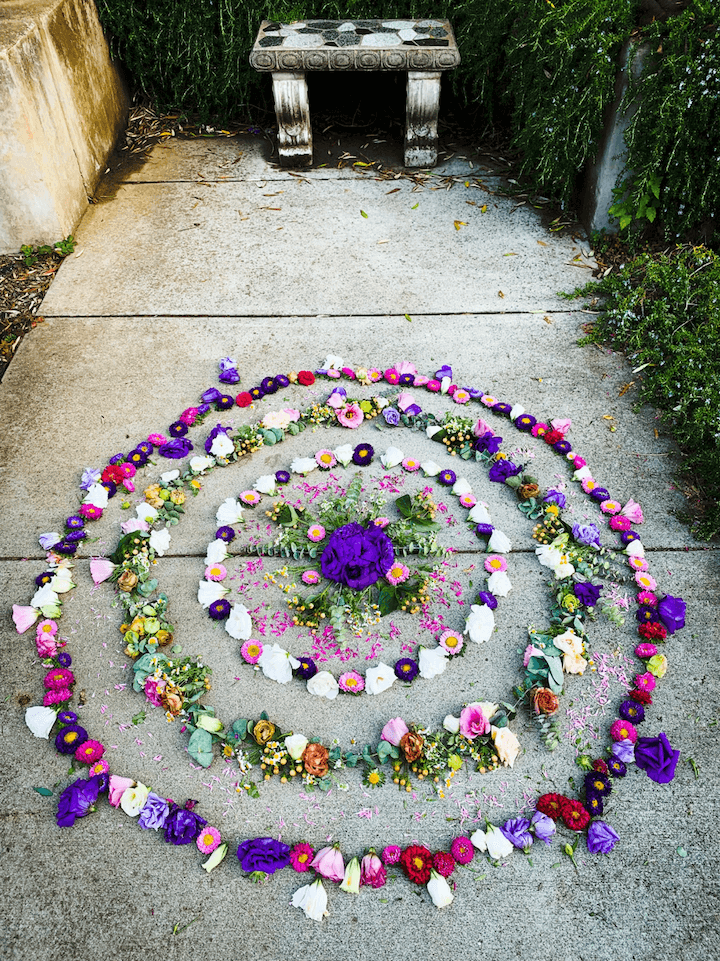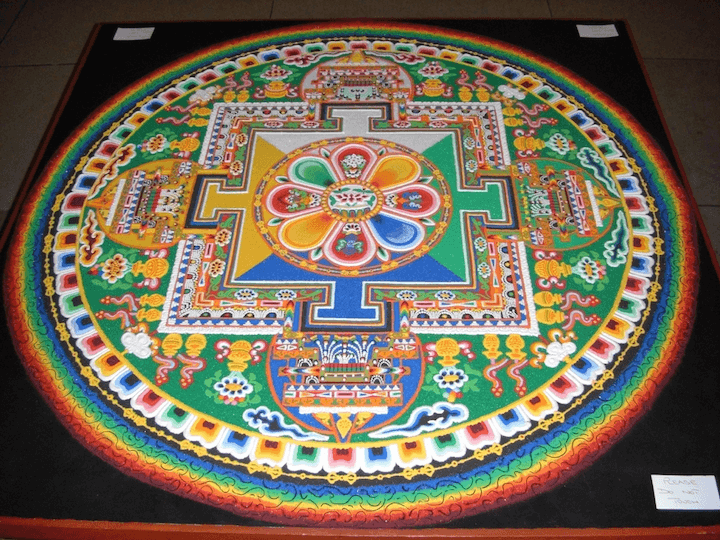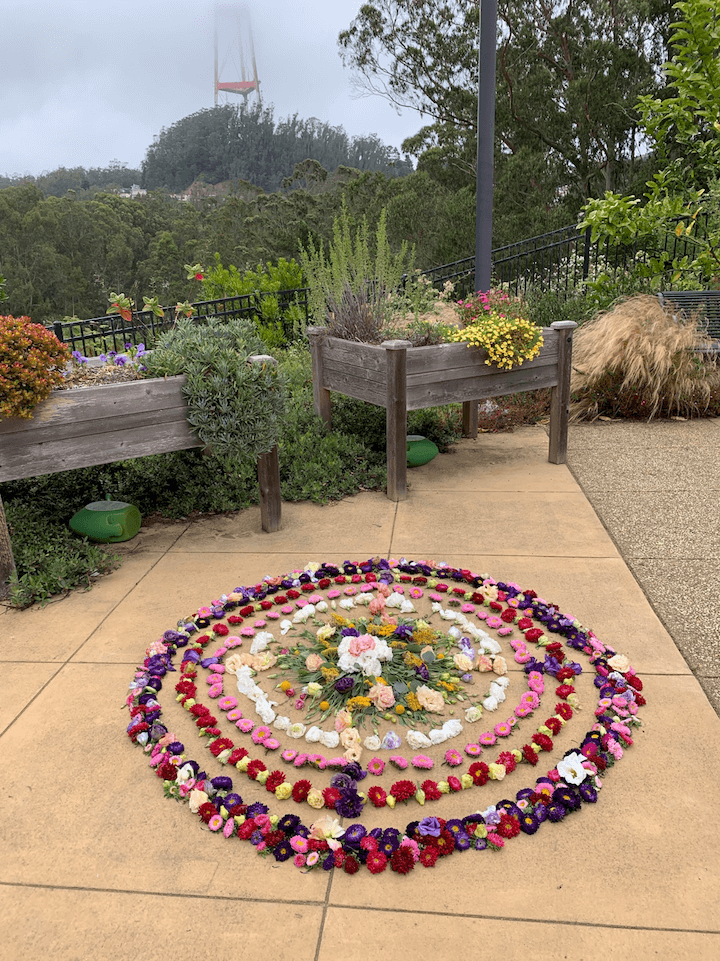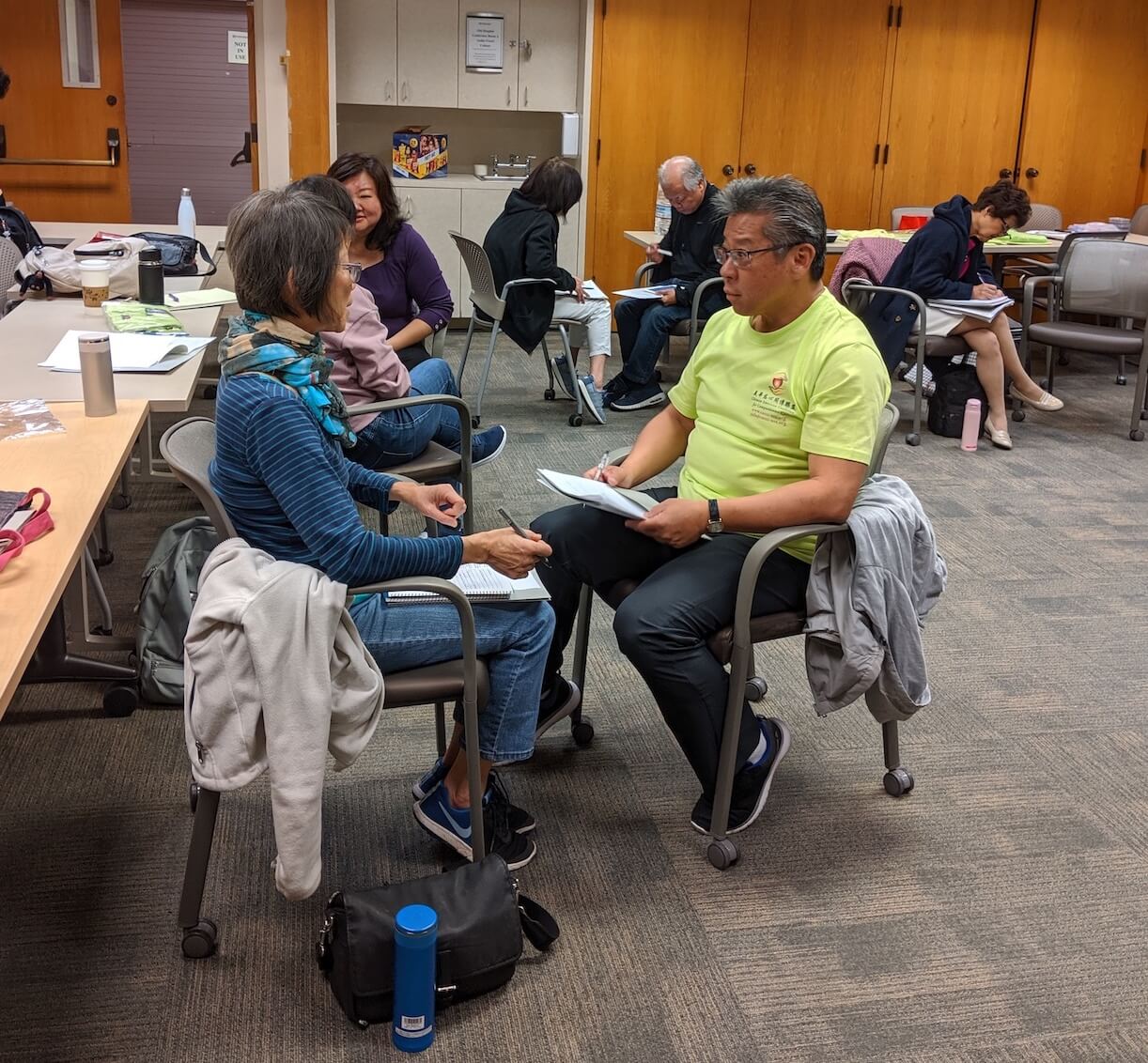From Our Blog
Zen Caregiving Project New Volunteer Training Update
“Working with the dying, you are constantly reminded of what matters: love, kindness, generosity, and our interconnectedness.” ~ Roshi Joan Halifax
Zen Caregiving Project will soon be taking applications for our Spring 2020 New Volunteer Training, to be held in April. The core training — an intensive 40 hours over ten days — is not oriented towards acquiring skills, so much as asking participants to examine and reflect on their own histories of loss and grief. By exploring our relationship to these issues, we become familiar with our own stories of suffering, enabling us to become more comfortable with the suffering of others. In other words, by becoming intimate with our own losses, our fears, and insecurities, we are more fully able to connect to the loss of others. We learn to connect through our shared vulnerability. This reflects the fundamental Buddhist teaching of interdependence and the Zen Caregiving philosophy of mutuality of service.
Please note that our open enrollment period runs until February 28th, and notification of the status of your application will not be sent out until mid-March. Applicants are required to attend all training sessions, including the Ongoing Sessions. We also ask participants to commit to a full year of service, volunteering one five hour shift per week on a regular schedule.
The application form for the New Volunteer Training will be live and accessible here on Monday, December 16th.
Zen Care Giving Project Spring 2020 New Volunteer Training Dates
Core Training
Wednesday & Thursday, April 15 & 16 (Evening Sessions), 5:45 PM – 10:00 PM
Saturdays & Sundays, April 18, 19, 25, & 26 (All Day), 8:30 AM – 5:30 PM
Ongoing Training (Third Tuesday Evening of the month)
Tuesday, May 19th, 7 PM – 9 PM
Tuesday, June 16th, 7 PM – 9 PM
Tuesday, July 21st, 7 PM – 9 PM
Tuesday, August 18th, 7 PM – 9 PM
Tuesday, September 15th, 7 PM – 9 PM
Attending Your Loved One’s Final Moments
Reddit is a great platform for asking important questions, I use it regularly and often come across posts that are thought-provoking. I cross-posted one recent question from the platform to our community on Facebook,
“Should I be in the room when they take my loved one off of life support?”
It’s a difficult question with no easy answers. I was curious to hear about the experiences of our followers and ultimately received varied yet quite insightful responses. Below is a sampling of the comments,
The question isn’t should I, but can I. If you can, then be there, and if you cannot … don’t. No wrong or right answer here and no one gets to judge you one way or the other!
…
Someone said to me it is an honor to be there when someone enters the world, it is also an honor to be there as they exit the world. And suddenly I got it, and felt so much better.
…
The most important question is…What do they want? What’s important to them? If they wish to be there then WE as a team should support them. We have no right to decide if they can “handle it” or not. We should allow them to decide what’s best for both their family and themselves.
…
Retired Hospice Chaplain here:
If you feel you can and have good support.
It can be a mystical, beautiful moment to be there at the time of passing, but if you aren’t sure, have someone (maybe a Hospice person) with you. I’ll hold you in prayer.
…
I recently experienced this with a dear friend who had suffered a massive heart attack and was taken off life support four days later. I knew that she was already gone, but I still did not want her to be alone. It wasn’t gruesome or disturbing; was difficult emotionally and profoundly sad. It helped me know that I was there for her until the very end.
It’s certainly a difficult question. What are your thoughts? You can comment under the original Facebook post if you’d like to leave a response.
Volunteer Training Schedule Announced
Spring 2020’s Open Enrollment is now open! You can also find more information about joining the volunteer program here.
Applicants must be able to attend all training sessions. Core training will be held on these dates,
Wednesday, April 15th & Thursday, April 16th, 2020, 5:45 PM – 10:00 PM
Saturday, April 18th & Sunday, April 19th, 2020, 8:30 AM – 5:30 PM
Saturday, April 25th & Sunday, April 26th, 2020, 8:30 AM – 5:30 PM
And ongoing training will be held on these dates,
Tuesday, May 19th, 7 PM – 9 PM
Tuesday, June 16th, 7 PM – 9 PM
Tuesday, July 21st, 7 PM – 9 PM
Tuesday, August 18th, 7 PM – 9 PM
Tuesday, September 15th, 7 PM – 9 PM
You can click here for more information relating to the volunteer program.
Emotional Support For Caregivers is Vital, So Why Aren’t We Talking About It?
Caregiving has got a bad rap
A lot of what we read about caregiving paints a very negative picture. Caregivers stressed by their caregiving responsibilities are at higher risk of experiencing fatigue, depression, and social isolation than non-caregivers, and some studies found that caregivers had decreased life expectancy compared to their non-caregiving equivalents.[1]
An interesting review of the research in the field from a professor at John Hopkins University points out that it isn’t caregiving per se that leads to these negative impacts, it is the stress response that caregiving can produce. In the case of research into life expectancy, those caregivers who were not over-strained had the same life expectancy as non-caregivers and, what’s more, in a few studies, caregivers had a longer life expectancy.[2] This leads to the conclusion that if we can find ways of helping caregivers reduce the stress they experience, we can protect them from the negative impacts of caregiving. Maybe we can even help them benefit from the positive effects of caregiving, such as a sense of purpose, increased confidence, and a deep connection.[3]
How can we reduce the stress of caregiving?
Stress occurs when a situation exceeds the resources that the caregiver feels they have to deal with it – we can all relate to that feeling of overwhelm and anxiety when we feel we are not able to manage the situation in front of us.
We can, therefore, reduce stress in two ways. The first is by changing the situation the caregiver is in so that it doesn’t exceed their resources to cope with it. Family caregivers can face a lot of situations that could contribute to a feeling of overwhelm, e.g., carrying out medical tasks with little training, the physical and emotional fatigue of many hours caregiving, adjusting to the loss of a relationship, loss of time for yourself and increased financial strain to name a few.[4] In response to this, there is a large number of caregiving programs that try in various ways to improve these external circumstances and support the reduce their external stressors by providing practical, logistical, and financial support to caregivers.
The second way to reduce stress is by building up the emotional resources of the caregivers. This helps them to feel more able to meet skillfully and cope with situations as and when they arise (life has a habit of presenting us with “interesting” events and situations when we least expect it!). This emotional resilience approach is the approach that Zen Caregiving Project takes in its Mindful Caregiving Education. In our courses, caregivers are taught mindfulness-based tools and strategies to help acknowledge, understand, and skillfully respond to challenges that arise in their caregiving. By teaching these skills, we are increasing the caregiver’s emotional resource or capacity, meaning they feel able to cope better with more situations whenever they happen and reduces the likelihood of them becoming overwhelmed and stressed.
It’s not an either/or
Here at Zen Caregiving Project, we champion all efforts to support the vital and powerful work that caregivers do, and we realize that a combination of both approaches described above is optimal. We are, however, sometimes surprised that emotional resilience-building is seen as “nice to have” rather than the essential skill we feel it is. Caregiving courses often focus on practical skills related to ADLs, or activities of daily living, like how to bathe or lift someone, or how to navigate the complex health systems. Yet, skills to support emotional resilience are conspicuously absent. Typically, suggestions for self-care when presented focus more on discrete activities such as doing regular exercise and having long baths. Both are great, but it’s best to address the problem of stress once it’s arrived rather than building a set of skills that strengthen emotional resilience and minimize the stress in the first place.
Skills that build emotional resilience aren’t magic cures. Still, we would argue they are equally as important as the more practical skills, both for the caregivers’ wellbeing and the quality of the care they provide to their loved ones.[5]
Work with us to build emotional resilience in those who need it
Here at Zen Caregiving Project, we offer our courses directly to caregivers and also work with partners in a range of sectors to build in emotional resilience into any caregiving support they provide. We hope to continue to raise awareness around and meet this vital need and welcome conversation and collaboration with the network of amazing organizations that work tirelessly to support caregivers.
[1]National Academies of Sciences, Engineering, and Medicine. 2016. Families. Caring for an Aging America.
[2] The authors hypothesized that the positives of caregiving such as having a feeling of purpose in your life, and a connection with the person you are caring for, could explain the longer life.
[3] See Families. Caring for an Aging America for a good overview of the positive and negative impacts associated with caregiving
[4] It is no surprise that in the research caregivers with greater external challenges (such as caring for a loved one with greater needs, greater time spent caring and caring for people while on a low income) all experience higher stress than those with less external challenges.
[5] A study by Ankuda et al (2017) found that those individuals whose caregivers had poor wellbeing were more likely to be admitted to the Emergency Department and have higher Medicare Expenditures.
Mandala Mondays

“We give life to the previous week’s flowers by creating a mandala as part of our closing ritual.” Cynthia Hogan, Bloom Project Volunteer
At Laguna Honda Hospital, nestled on the west side of San Francisco’s Twin Peaks, there is a secret garden. Tucked into the hill behind the South Tower and accessible only from the Palliative Care Ward, S3, is a serene oasis maintained by the volunteers of Zen Caregiving Project. It is a refuge for the residents, family members, staff, and volunteers of S3.
Every Monday morning, volunteers from the Bloom Project meet there for two hours to cut and arrange fresh flowers that are donated for the residents of the ward. When they are done, they create a mandala out of left over blossoms.
From the Sanskrit, the word mandala literally means circle or disk. They are geometric representations of the universe or wholeness, encompassing both the material and non-material worlds and appear frequently in Buddhist and Hindu iconography as well as Native American culture. Tibetan Buddhism, in particular, has a tradition of creating sand mandalas that are demolished after their completion and accompanying ceremony.

Mandalas are symbols of impermanence, reminders of the fleeting nature of both beauty and life. As the days pass in the S3 garden, the blooms fade and the symmetry of the flowers become jumbled by the wind, a poignant testament to the inescapable reality of change.
The mandalas are created by the group or any individual who feels moved to do so. For volunteer Roberta Weiss, “Participating in mandala creation is a healing artistic activity and meditative practice.” Volunteer Janice Polizzi explains, “When the work is done we stand in a circle and dedicate the beauty to others… Our intention is always to offer well wishes and healing.”
Rosemarie Morales finds connection and meaning in her work with the Bloom Project having had personal experience with the difference that flowers can make for people in care facilities. The joy that she witnessed when bringing flowers to her father was a catalyst for joining the Bloom Project.
For her, building a mandala is just as important as arranging the flowers. “I love being a part of creating the mandala – from being able to realize the uniqueness of what each flower has to offer, to the process itself of creating a pattern and seeing how much even one flower can enhance the collective display of a whole design, to setting intentions out to the universe once the mandala has been completed. It’s a fun and beautiful process that I hope brings light to people’s hearts.”

Dying and Death in the Zen Tradition on Shapes of Grief
Listen to Zen Caregiving Project executive director Roy Remer speak with Liz Gleeson, a grief therapist and host of the podcast Shapes of Grief. In this episode Roy talks about death and dying in the Zen tradition.
Through the recounting of our grief stories, integration can begin to happen, both for the teller and the listener. Everyone has a story of loss and everyone’s story offers hope and inspiration to other grievers. Sharing these stories with each other can go a long way in normalising this human experience.
Liz Gleeson
It’s National Hospice and Palliative Care Month!
It’s National Hospice and Palliative Care Month! Now is a great time to bring awareness to hospice and palliative care and to talk about related programs, facts about hospice and palliative care, dispel myths about hospice, and to highlight members of the community.
Upcoming events
Zen Caregiving Project has three events coming up in November. On November 2nd, tomorrow, we have the Open Death Conversation: End-of-Life Contemplation online course, Touching Moments: One-Day Training on the 16th and a workshop on Grief and the Holidays.
In other news
In other news, the Palliative Care and Hospice Education and Training Act (PCHETA, H.R.647) passed the House via unanimous voice vote and heads to the Senate, the Third Annual National Caregiving Conference is coming to Chicago on November 8th through November 11th at the Chicago Marriott O’Hare and Center for Medicare & Medicaid Innovation announced the release of the Primary Care First Model Application.
Share your news
You can share your hospice and palliative care news using the #HospiceMonth and #MyHospice hashtags!
How does that translate?
Supporting Family Caregivers
Caregiving can be a life-affirming experience; it can bring us closer to those we love and bring a sense of purpose to what we do. It can also be difficult, upsetting, and emotionally draining. Our Mindful Family Caregiving course is tailored to the needs of family caregivers and teaches mindfulness-based approaches and tools to help caregivers build their emotional resilience and improve their wellbeing.
The Need for Translation
Our course is currently only in English, making it inaccessible to a whole section of the caregiving population in the US. In Califonia alone, there are over 1 million Chinese speakers, over half of whom feel they speak English “less than well.” To tackle this issue we have partnered with the non-profit the Chinese American Coalition for Compassionate Care (CACCC) to translate our Mindful Family Caregiving program into Mandarin and use it to reach and support Chinese-speaking family caregivers. The project includes Zen Caregiving Project training CACCC volunteers to deliver modules of our Mindful Family Caregiving course, as well as working with CACCC to translate all our materials into Mandarin.
Translation is Not as Aimple as It Sounds!
We kicked off the project by running a 2-day Mindful Family Caregiving course for the 10 CACCC volunteers who will become instructors. It was a pleasure to work with such thoughtful and dedicated volunteers who were enthusiastic learners, and each brought their own experience and wisdom to the course discussions. We also had fascinating conversations about translation. What, for example, is the Mandarin term for “Healthy Boundaries”? Or “Essential Self”?
The process also helped us examine how cultural norms play a part in what we teach. For example, in Chinese culture, it is much more common for elderly parents to move in with their adult children than in American culture, so how should we best frame a discussion on the pressures that close living-situation can bring?

What’s Next?
We’ll be working through a process of translation, and further training for the volunteers, so watch this space for updates on our work. We are very excited for the year ahead, training this diverse, thoughtful, passionate group of people who can reach such a large number of family caregivers that are in need.
If you work with an organization that supports Spanish-speaking family caregivers and are interested in working with us to translate our course into Spanish, we would love to hear from you. Please contact us at https://zencaregiving.org/contact-us/
Our Events at the ReImagine Festival
We’re hosting four events at the ReImagine festival

Reimagine End of Life is a week-long community-wide exploration of death and celebration of life through creativity and conversation. Back in the Bay Area for the second year, there are over 150 events across the area looking at different aspects of death including talks, art exhibits, comedy shows, cooking events and interactive activities. Check out the extensive schedule here.
Zen Caregiving Project will be running four events as part of ReImagine:
- Two Open Death Conversations forums – a space to talk about and explore death and dying, one in-person (Oct 25) and one online (Nov 2).
- One Foundations of Mindful Caregiving (Oct 26-27). This course is a deep immersion into time-tested practices for cultivating mindfulness and compassion in caregivers.
We look forward to seeing you there!
A New Brand and Website, the Same Unique Approach to Caregiving

We are excited to launch our new website, along with our new public-facing name, Zen Caregiving Project. We believe this name best holds all of our activities and offerings and is dynamic and inclusive of all caregivers and care recipients. We are optimistic that this shift will help us serve more people and expand our impact long-term.
This change has prompted questions from many people who have followed and supported our work as Zen Hospice Project, and this blog aims to answer some of those questions and reassure our supporters that our commitment to caregivers remains stronger than ever.
Why the changes?
From our organization’s founding until September 2019, we were known as Zen Hospice Project. This name represented our work and focus for over 30 years. However, in 2018, we closed our Guest House care facility, and our focus has evolved from working solely with those approaching end-of-life to include caregivers who support those living with chronic and terminal illnesses.
We encourage caregivers to learn emotional skills early in their caregiving journey to support well-being and provide higher quality care. We have learned that if family caregivers wait until their loved one is hospice eligible before they seek the support our courses provide, they are often already dealing with acute distress or burnout. We want to positively impact the well-being of all caregivers working in any healthcare environment. In light of our expanded focus, we believe that “hospice” in our name no longer conveys the scope of services we offer.
While our public-facing name will be Zen Caregiving Project, our legal name will remain Zen Hospice Project. We recognize the powerful goodwill and brand recognition this name has garnered over the years and plan to continue to leverage it to maximize positive social impact through all our activities. If you’re interested in reading more information on the evolution of our name see our website FAQs.
What programs does Zen Caregiving Project offer?
We offer programs in three main areas:
- Our Mindful Caregiving Education teaches mindfulness-based approaches to caregivers to build emotional resilience. Our curriculum supports skillful coping with the stress and loss that is often part of the experience of assisting persons living with chronic and terminal illnesses. We’ve expanded our offerings to include online courses so caregivers can now take this course from almost anywhere! Check here for upcoming courses.
- Our Volunteer Caregiving Program trains volunteers in practices that help them provide compassionate support to people in long-term palliative and hospice care settings. Our flagship volunteer program on Laguna Honda Hospital’s Palliative Care ward is thriving. Read more about the Volunteer Caregiving Program here.
- Through our Workshops on Loss, we host a variety of forums to talk about loss and death to promote a healthy relationship with death and loss and to support compassion for those going through the end of life experience. You can explore upcoming courses here, and our listings in the upcoming ReImagine festival.
With our new website, we have made our programs easier to find and more tailored to the needs of those seeking our support.
What next?
We’d appreciate if you could share our new site and courses with anyone you think may find them useful. We’d also love to hear from you about collaborating as we believe that better caregiving happens through networks of inspired people and organizations working together. Our Partners page shows examples of how we have and are partnering with a range of different organizations to support caregivers, and those they serve.

